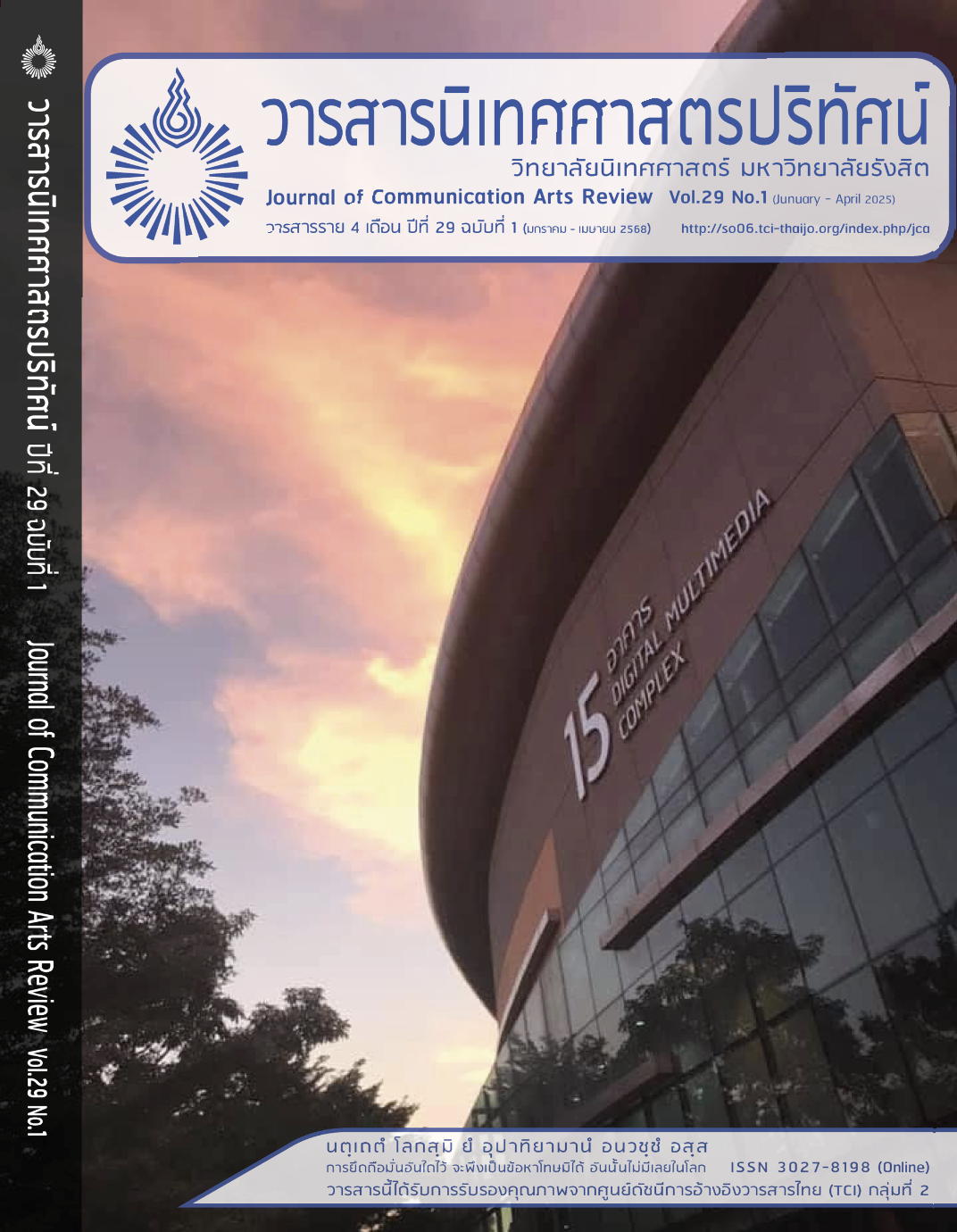The Study of Millennial Parents' Perspectives and Knowledge on the Importance of Child Car Seats and Purchasing Decisions
คำสำคัญ:
Millennial Parents, Child Car Seats, Children’s Safety, Injury Prevention, Purchasing Decisionsบทคัดย่อ
This qualitative study examined the perspectives of millennial parents in Thailand on the importance of child car seats and their impact on child safety and injury prevention. The research addressed a gap in the existing literature by exploring the factors influencing these parents' decision-making processes when purchasing child car seats. Utilizing the Knowledge, Attitude, and Practice (KAP) model, the Marketing Mix (7Ps), and the Consumer Decision-making Process frameworks, the study provides a comprehensive analysis of parental behaviors and attitudes toward car seat usage.
18 millennial parents, aged 28 to 43, each with at least one child under 6 years old, were interviewed in-depth. The findings revealed that these parents had moderate knowledge and strong positive attitudes toward the necessity of child car seats, especially for newborns. However, practical challenges such as children's resistance and the perceived convenience of short trips often lead to inconsistent adherence to safety protocols. Among the brands, Chicco emerged as the most preferred.
The study also highlighted distinct purchasing behaviors among millennial parents. Safety and quality are prioritized, with significant investments typically made in the first car seat, while subsequent purchases were approached with greater budget-consciousness. Mothers were particularly influenced by promotional offers like discounts and free gifts, whereas fathers focused on product features and functionality, relying heavily on prior knowledge and research. This indicated a collaborative yet distinct approach in the decision-making process, where both parents played crucial roles.
เอกสารอ้างอิง
Ang, J., et al. (2020): Awareness, Perception and Experience on Child Restraint System (CRS) And Its Legislation Among Malaysian Parents with Newborns, Traffic Injury Prevention, 21(4), pp. 1-5
Ayuningtyas, F., Prihatiningsih, W., and Laura, R. (2018). The Pattern of Online Purchase Behavior by Millennial Family. Malaysian Journal of Social Sciences and Humanities (MJSSH), 3(5), pp. 10 - 16
Anitsal, M., Anitsal, I., and Liska, K. (2009). Determinants of Booster Seat Usage: What Makes Parents Commit to Using Booster Seats on a Regular Basis. Journal of Management and Marketing Research, pp. 1 - 12
Asavachongruk, K. (2019). Purchasing Determinants, Kid Market, Consumer Behavior, Generation Y Mother. [Thesis,Chulalongkorn University].
Assael, H. (1998). Consumer behavior and marketing action: (6th ed., pp. 291-292, 368). Cincinnati, OH: South-Western College.
Atayoglu, A. T, and Atayoglu, A.G. (2023). Assessment of car seat safety awareness among parents: The vital role of family physicians. Medical Science and Discovery, 10(2), pp. 103-108
Atinwong, P. (2022). Parents’ Knowledge, Attitudes, And Experience Towards Car Seat Use For Children. [Independent Study,Mahidol University].
AlSallum, G. A., et al. (2019). Parent’s knowledge, attitude, and practice about children’s car seats at Unaizah city, KSA. Journal of Family Medicine and Primary Care, 8, pp. 805-811.
Cai, W., et al., (2021). Child restraint system use and its associated factors in Shenzhen. Accident Analysis and Prevention, 160, pp. 1 - 6
Champahom, T., et al., (2023). Investigating Parents’ Attitudes towards the Use of Child Restraint Systems by Comparing Non-Users and User Parents. Sustainability, 15, 2896, pp. 1-24.
Chuathue, N. (2017). Factors influencing millennial mothers’ buying decisions of complementary food for infants and young children.[Master’s Thesis,Mahidol University].
Chen, X., et al., (2014). Parents’ Knowledge, Attitude, and Use of Child Restraints, Shantou, China. American Journal of Preventive Medicine, 46(1), pp. 85–88
Išoraite, M. (2021). 7 P Marketing Mix Literature Review. International Journal of Trend in Scientific Research and Development, 5(6), pp.1586-1591.
Kertsombat, T. (2008). Knowledge, attitude and participation of people in Bangkok toward the campaign of stopping global warming in Bangkok [Mater’s Individual Report, Thammasat University, Bangkok].
Lertvittayatan, A. (2016). The Influence of Marketing Mix Towards the Overall Satisfaction of Parents on Franchised Music Schools in Bangkok. [Master’s Individual Report, Thammasat University, Bangkok].
Liu, X., et al., (2016). Knowledge, Attitudes and Behaviors on Child Passenger Safety among Expectant Mothers and Parents of Newborns: A Qualitative and Quantitative Approach. PLoS ONE 11(1), pp. 1-12.
Pew Research Center. (2019). Defining generations: Where Millennials end and Generation Z begins. https://www.pewresearch.org/short-reads/2019/01/17/where-millennials-end-and-generation-z-begins/
PPTV. (2022). หมอย้ำจำเป็นต้องใช้ ‘คาร์ซีท’ แม่อุ้มไม่ปลอดภัยพอ. https://www.pptvhd36.com/automotive/news/171808
Richards, M. N., Putnick, D. L., and Bornstein, M. H. (2020). Toy Buying Today: Considerations, Information Seeking, and Thoughts about Manufacturer Suggested Age, Journal of Applied Developmental Psychology, 68, p. 1-20.
Solomon, M. R. (2011). Consumer behavior: Buying, having, and being: (9th ed.). Upper Saddle River, NJ: Pearson Prentice Hall
Tan, R. M. R., et al., (2020). Parental knowledge and beliefs on the use of child car restraints in Singapore: a qualitative study. Singapore Med J, 61(2), pp. 102-107.
Termworasin, P., Lumbiganon, D., and Prueksapraopong, C. (2021). Car Seat Knowledge and Car Seat Use among Parents of Preschool Children in Bangkok, Thailand. Vajira Medical Journal: Journal of Urban Medicine, 65(2), pp. 95-106.
Thailand Development Research Institute (TDRI). (2023). ย้อนดูสถิติเจ็บ-ตายบนถนนไทย ปี 2564 – 2566 เดินหน้าสู่เป้าหมายลดผู้เสียชีวิตก่อนปี 2570. https://tdri.or.th/road-safety/
Thai Consumer Council. (2022). เลือกคาร์ซีทอย่างไร?…ให้ปลอดภัย. https://www.tcc.or.th/tcc_media/info-how-to-choose-carseat/
Thai PBS. (2017). “คาร์ซีท” ลดการเสียชีวิตของเด็กจากอุบัติเหตุถึงร้อยละ 60. https://www.thaipbs.or.th/news/content/261517
Thai PBS. (2023). เด็กอายุไม่เกิน 6 ปีต้องนั่ง “คาร์ซีท” ยกเว้นรถรับจ้าง-รถสาธารณะ. https://www.thaipbs.or.th/news/content/330763
Thai Road Safety Center (Thai RSC). (2024). การเปรียบเทียบสถิติการเกิดอุบัติเหตุทางถนนในประเทศไทย.https://www.thairsc.com/data-compare
Than Settakij. (2023). กฎหมายใหม่คุม “คาร์ซีท” ต้องติดตั้งระบบ ISOFIX จ่อบังคับใช้เร็วๆนี้. https://www.thansettakij.com/business/economy/582374#google_vignette
The Asian Parent Insight. (2020). Marketers, Mums, and Everything In Between (March 2020). https://insights.theasianparent.com/product/advertising-to-mums
The Asian Parent. (2021). Dadvertising : July 2021 Branding when Dad’s Role is Changing. https://insights.theasianparent.com/product/dadvertising-2021-thailand
The Asian Parent. (2022). Digital Mum Survey Thailand 2022 (May 2022). https://insights.theasianparent.com/checkout/order-received/10132?key=wc_order_yjzSjxwKsfX5j
The Asian Parent. (2024). คาร์ซีทสำหรับเด็ก ชวนคุณแม่เลือกอุปกรณ์ที่ช่วยให้ลูกน้อยปลอดภัยขณะนั่งรถ. https://th.theasianparent.com/best-baby-car-seat
The Royal College of Pediatricians of Thailand (2023). 5 นาที รู้จริงเรื่องเด็กจากราชวิทยาลัยกุมารแพทย์ Ep 5: Carseat. https://th.theasianparent.com/best-baby-car-seat
The Standard. (2022). Car Seat สำคัญอย่างไร ภาครัฐควรมีนโยบายอะไรเพิ่มเติมบ้าง. https://www.thaipediatrics.org/?p=2220
The Thai Senate Newsletter. (2022). พระราชบัญญัติจราจรทางบก (ฉบับที่ ๑๓) พ.ศ. ๒๕๖๕ กับการกำหนดให้เด็กต้องนั่งในที่นั่งนิรภัย (Car Seat). https://www.senate.go.th/assets/portals/93/fileups/253/files/Analysis/65/11_66_1.pdf
Thienthaworn, C. (2024). Perceptions, Attitudes and Purchase Intentions of Millennial Mothers Towards Eco-Friendly Toys for Children. Journal of Communication Arts Review, 28(1), pp. 126-141.
Tu, JC., Chen, YY., Lee, YL. et al. (2021). Investigating the use of environmental tableware based on the theory of planned behavior. Environ Dev Sustain. 23, 10013–10037
World Health Organization (WHO). (2023). เป้าหมายในปีใหม่ที่ช่วยชีวิตคุณได้. https://www.who.int/thailand/news/detail/03-01-2023-a-new-year-s-resolution-for-life-TH


